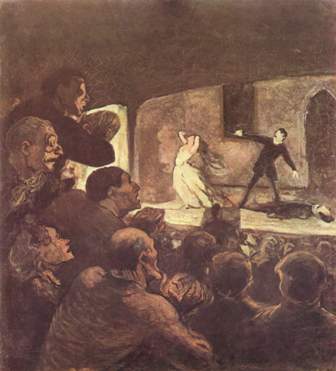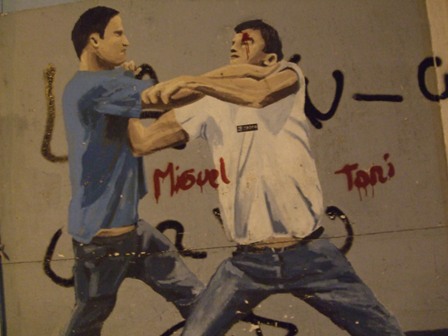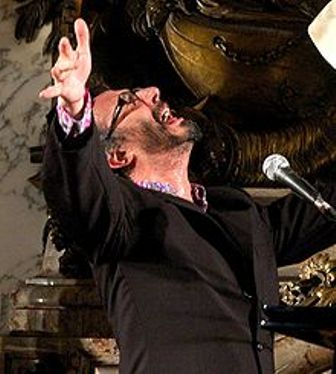
"The task of our time is to insist that we can afford to build a decent, inclusive society -- while at the same time, respect the real limits to what the earth can take," said journalist and author Naomi Klein recently during an Occupy Wall Street protest demonstration.
Her words clearly synthesize what growing numbers of persons feel as the financial and globalization crisis set off by the scandalous speculation of giant corporations and financial interests drags on, while unemployment grows, while politicians and financial experts demand belt tightening and while angry protestors fill the streets in Greece, Spain, the U.S. and other countries affected by the crunch.
“It is time to insist that we can afford to build a decent, inclusive society—while at the same time, respect the real limits to what the earth can take,” she declared.
Is the “occupy” movement in the U.S. just a momentary reflection of similar but different mobilizations in Europe and the Middle East, or is it a genuine political-cultural response that hints at a significant turnabout, a refurbished version of the social protest movements during the l960? Does it only have to do with the financial crisis or is it also related to a point of no return in globalization, or an attempt to restructure capitalism?
With her words, Klein, one of the most respected non-establishment voices, appears to give some clues to those questions. For that we reproduce here her views:
“Yesterday, one of the speakers at the labor rally said: “We found each other.” That sentiment captures the beauty of what is being created here. A wide-open space (as well as an idea so big it can’t be contained by any space) for all the people who want a better world to find each other.”
She continued: “If there is one thing I know, it is that the 1 percent loves a crisis. When people are panicked and desperate and no one seems to know what to do, that is the ideal time to push through their wish list of pro-corporate policies: privatizing education and social security, slashing public services, getting rid of the last constraints on corporate power. Amidst the economic crisis, this is happening the world over.
And there is only one thing that can block this tactic, and fortunately, it’s a very big thing: the 99 percent. And that 99 percent is taking to the streets from Madison to Madrid to say "No. We will not pay for your crisis."
That slogan began in Italy in 2008. It ricocheted to Greece and France and Ireland and finally it has made its way to the square mile where the crisis began.
"Why are they protesting?" ask the baffled pundits on TV. Meanwhile, the rest of the world asks: "What took you so long?" "We’ve been wondering when you were going to show up." And most of all: "Welcome."
Many people have drawn parallels between Occupy Wall Street and the so-called anti-globalization protests that came to world attention in Seattle in 1999. That was the last time a global, youth-led, decentralized movement took direct aim at corporate power. And I am proud to have been part of what we called "the movement of movements."
But there are important differences too. For instance, we chose summits as our targets: the World Trade Organization, the International Monetary Fund, the G8. Summits are transient by their nature, they only last a week. That made us transient too. We’d appear, grab world headlines, then disappear. And in the frenzy of hyper patriotism and militarism that followed the 9/11 attacks, it was easy to sweep us away completely, at least in North America.
Occupy Wall Street, on the other hand, has chosen a fixed target. And you have put no end date on your presence here. This is wise. Only when you stay put can you grow roots. This is crucial. It is a fact of the information age that too many movements spring up like beautiful flowers but quickly die off. It’s because they don’t have roots. And they don’t have long term plans for how they are going to sustain themselves. So when storms come, they get washed away.
Being horizontal and deeply democratic is wonderful. But these principles are compatible with the hard work of building structures and institutions that are sturdy enough to weather the storms ahead. I have great faith that this will happen.
Something else this movement is doing right: You have committed yourselves to non-violence. You have refused to give the media the images of broken windows and street fights it craves so desperately. And that tremendous discipline has meant that, again and again, the story has been the disgraceful and unprovoked police brutality. Which we saw more of just last night. Meanwhile, support for this movement grows and grows. More wisdom.
But the biggest difference a decade makes is that in 1999, we were taking on capitalism at the peak of a frenzied economic boom. Unemployment was low, stock portfolios were bulging. The media was drunk on easy money. Back then it was all about start-ups, not shut downs.
We pointed out that the deregulation behind the frenzy came at a price. It was damaging to labor standards. It was damaging to environmental standards. Corporations were becoming more powerful than governments and that was damaging to our democracies. But to be honest with you, while the good times rolled, taking on an economic system based on greed was a tough sell, at least in rich countries.
Ten years later, it seems as if there aren’t any more rich countries. Just a whole lot of rich people. People who got rich looting the public wealth and exhausting natural resources around the world.
The point is, today everyone can see that the system is deeply unjust and careening out of control. Unfettered greed has trashed the global economy. And it is trashing the natural world as well. We are overfishing our oceans, polluting our water with fracking and deepwater drilling, turning to the dirtiest forms of energy on the planet, like the Alberta tar sands. And the atmosphere cannot absorb the amount of carbon we are putting into it, creating dangerous warming. The new normal is serial disasters: economic and ecological.
These are the facts on the ground. They are so blatant, so obvious, that it is a lot easier to connect with the public than it was in 1999, and to build the movement quickly.
We all know, or at least sense, that the world is upside down: we act as if there is no end to what is actually finite -- fossil fuels and the atmospheric space to absorb their emissions. And we act as if there are strict and immovable limits to what is actually bountiful -- the financial resources to build the kind of society we need.
The task of our time is to turn this around: to challenge this false scarcity. To insist that we can afford to build a decent, inclusive society -- while at the same time, respect the real limits to what the earth can take.
What climate change means is that we have to do this on a deadline. This time our movement cannot get distracted, divided, burned out or swept away by events. This time we have to succeed. And I’m not talking about regulating the banks and increasing taxes on the rich, though that’s important.
I am talking about changing the underlying values that govern our society. That is hard to fit into a single media-friendly demand, and it’s also hard to figure out how to do it. But it is no less urgent for being difficult.
That is what I see happening in this square. In the way you are feeding each other, keeping each other warm, sharing information freely and proving health care, meditation classes and empowerment training. My favorite sign here says "I care about you." In a culture that trains people to avoid each other’s gaze, to say, "Let them die," that is a deeply radical statement.
A few final thoughts. In this great struggle, here are some things that don’t matter.
- What we wear.
- Whether we shake our fists or make peace signs.
- Whether we can fit our dreams for a better world into a media soundbite.
And here are a few things that do matter.
- Our courage.
- Our moral compass.
- How we treat each other.
We have picked a fight with the most powerful economic and political forces on the planet. That’s frightening. And as this movement grows from strength to strength, it will get more frightening. Always be aware that there will be a temptation to shift to smaller targets -- like, say, the person sitting next to you at this meeting. After all, that is a battle that’s easier to win.
Don’t give in to the temptation. I’m not saying don’t call each other on shit. But this time, let’s treat each other as if we plan to work side by side in struggle for many, many years to come. Because the task before will demand nothing less.
Let’s treat this beautiful movement as if it is most important thing in the world. Because it is. It really is.”
Naomi Klein is an award-winning journalist and syndicated columnist and the author of the international and New York Times bestseller The Shock Doctrine: The Rise of Disaster Capitalism (September 2007); an earlier international best-seller, No Logo: Taking Aim at the Brand Bullies; and the collection Fences and Windows: Dispatches from the Front Lines of the Globalization Debate (2002). Read more at Naomiklein.org. You can follow her on Twitter @naomiaklein.
Note: The photograph is from the Village Voice blogs.






